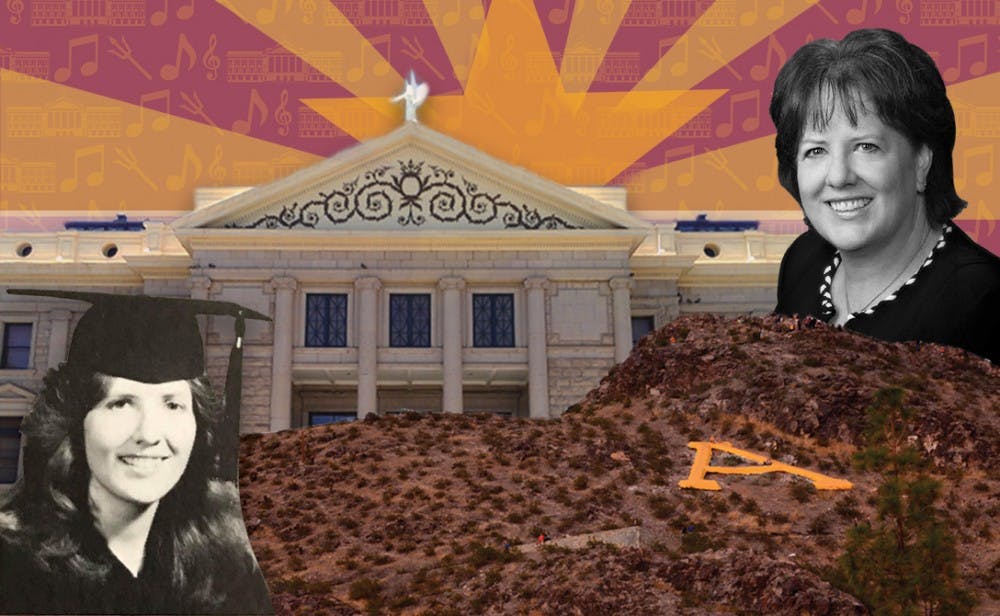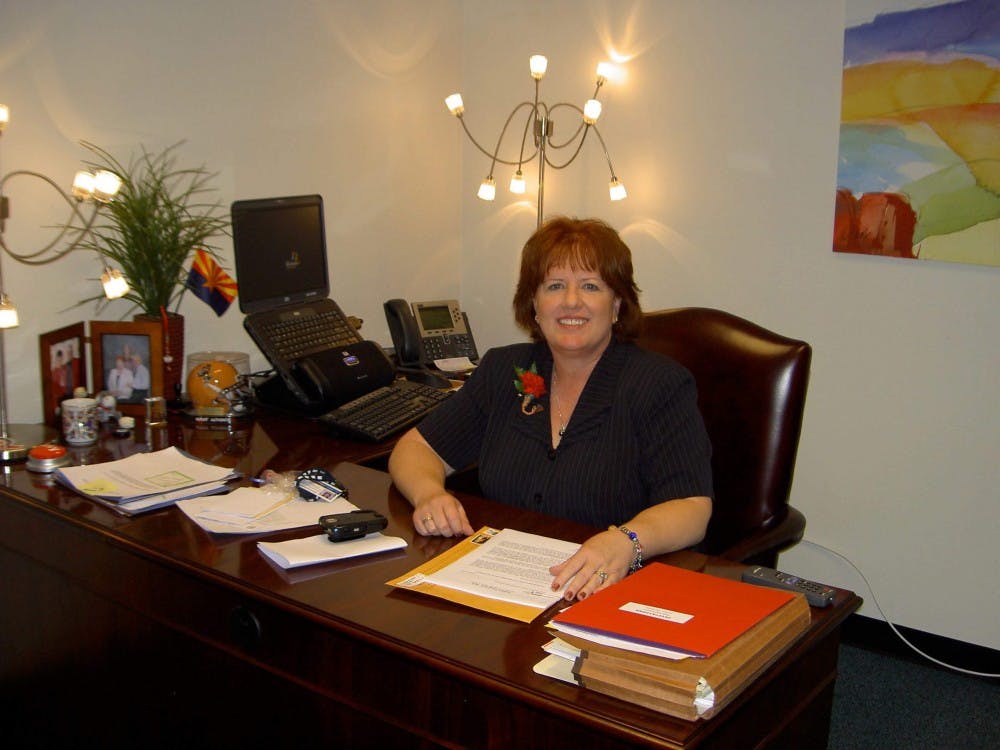My first interaction with government wasn’t when I registered to vote, or in high school U.S. government. Rather, it was in my fourth grade orchestra class.
In Phoenix's Lookout Mountain Elementary School, it was a big deal to be in the fourth grade. You got to go on cooler field trips, you had the chance to run for student council and you got to pick an instrument to play.
When I entered the fourth grade in 2005, Jackie Thrasher, the band and orchestra instructor, was one of the most-admired teachers around.
If you made her laugh, which wasn’t hard to do, you were rewarded with a loud, melodic chuckle that was the vocal equivalent to being handed a gold star.
She was also a patient woman — you had to be to work with a bunch of energetic kids accidentally doing everything in their power to break expensive instruments. But when she did resort to anger, her face would turn the same color as her brilliant red hair, and you’d find yourself swearing you’d make it up to her somehow.
When it was finally time for me to make my first big decision, I decided to play the cello. It was comical to see a scrawny nine-year-old hold an instrument that, when I sat down, was taller than I was. My class was small.
Most of the cooler kids had chosen to join band, but our orchestra still managed to sound like a barrage of fed-after-midnight Gremlins scraping their nails against several hundred chalkboards.
Thrasher didn’t care, though. She knew most of us were not destined to be professional musicians. But she knew that some of us would become doctors, lawyers, journalists and politicians. Some of us would be teachers one day, too. That’s why she decided to fight for our education.
Arizona is extremely lacking in funding and support for its schools. In a 2017 WalletHub study, Arizona is ranked last overall, and ranked No. 48 in “job opportunity and competition” and No. 50 in “academic work and environment.”
When I was in fifth grade, she told my class she had a special announcement: She was running to be a legislator in the Arizona House of Representatives.
Thrasher taught band and orchestra at Lookout Mountain Elementary School for 25 years and ran for the Arizona state legislature a total of six times over a decade. However, the only race she won was in 2007.
Eager to Learn
Thrasher describes herself as an “almost” Arizona native. She was born in Detroit and moved to Phoenix when she was two years old. Thrasher attended public school in the Washington Elementary School District in the 1960s when Arizona schools had funding to keep up with the curriculum.
“(The district) was known as one of the best school districts in Phoenix,” Thrasher says. “People were moving to that district because of the schools.”
In high school, Thrasher began playing the flute and decided to major in musical performance when she attended Glendale Community College. After two-and-a-half years, she transferred to Arizona State University with dreams of becoming a studio musician in California.
But she soon started thinking those dreams were out of reach.
“The more I studied, the more I realized you got to be one in a million for that,” Thrasher says.
Thrasher married a fellow musician right after graduating from ASU in 1979, and she decided to try out teaching band at the elementary school level rather than stay at home. Thrasher says she didn't want to just hang out around the house while her husband had a career.
When she started teaching, Thrasher became a witness to some of the problems plaguing Arizona’s education system, especially in terms of its arts programs. Due to budget restrictions, Thrasher had to split her time between Moon Mountain and Shaw Butte elementary schools.
“It was kind of a bummer,” Thrasher says. “You never got to know anybody (because) you were always at the other school.”
After spending her first few years of teaching doing this back-and-forth, Thrasher was able to leave Moon Mountain and Shaw Butte in exchange for a full-time position at Lookout Mountain, the school Thrasher would spend the next three decades at.
It was at Lookout Mountain that Thrasher was able to find life-long friendships among her co-workers.
Jean Doud, one of these friends and former co-workers, started working at Lookout Mountain in 1985, the same year as Thrasher. Doud and Thrasher both played flute, were about the same age and both had a passion for teaching kids the joys of music.
“We just hit it right off the bat,” Doud says.
Luckily for its students and teachers, Lookout Mountain was an oasis in a desert full of underfunded, struggling elementary schools. My teachers were never concerned about running low on classroom supplies, and the PTA was filled with eager parents.
Especially in terms of its music programs, Lookout Mountain had no shortage of creative outlets for its students. When I was at Lookout Mountain from 2004 to 2008, third graders played plastic recorders, tinkered on electric keyboards, learned how to read sheet music in choir and took introductory violin lessons.
In contrast, Thrasher recalls that nearly every student at Shaw Butte was on free or reduced lunch programs.
“We have these things that are like rich schools and poor schools, and that’s really offensive to me,” Thrasher says. “People were saying, ‘Well, sure, you’ve got a big program because your kids can afford to rent an instrument.’ If I had taught at a school where that wasn’t the case, I would’ve found a way for them to use (instruments) for free.”
The final push for Thrasher to enter the political spectrum came shortly after the 9/11 attacks on the World Trade Center.
“A lot of people evaluated their participation and level of service to (their) country,” Thrasher says. “So many people reevaluated, ‘What am I doing for my country?' I felt that feeling."
Testing the Political Waters
In 2002, Thrasher decided to run for the Arizona House of Representatives. She had never run a campaign before, so she sought the help of the Citizens Clean Elections Commissions, a non-partisan commission that provides funding for political candidates as long as they meet the qualifying number of signatures.
“We all need to participate somehow,” Thrasher says. “Not everybody can run for office, but I felt comfortable trying.”
Doud remembers feeling proud Thrasher had decided to take a stand for their students.
“I thought it was awesome because she had a passion for education,” Doud says. “That was going to be her platform. She was enthused to make a change and make things better for teachers and kids in general.”
Thrasher says she also quickly gained the support of the Arizona Education Association, but she didn’t just catch the attention of fellow educators.
At first, Chuck Foy was just another stop on Thrasher’s door-to-door fundraising mission, but the two almost immediately struck up a friendship that would eventually turn Foy into Thrasher’s campaign manager in 2006.
Foy says he’s not the right type of person to run for office himself, but that he’s got a knack for making others into good political candidates. He’s had experience running other local campaigns and knew Thrasher could make it into the state government.
“She is one of those people you are immediately drawn to,” Foy says. “I don’t know anyone who dislikes her as a person.”
Thrasher lost in 2002, but she wasn’t deterred.
“I had no expectation I would win,” Thrasher says.
Thrasher was determined to try again, if not for herself, then for the kids she was teaching every weekday.
“Who’s standing up for kids? Kids can’t vote,” Thrasher says. “Legislature, in my opinion, was hurting the kids.”
In 2004, Thrasher tried again and lost again. Although this race was closer, she didn’t have the funding to run again.
Thrasher thought her stint with politics was over until she got a call from the Arizona House Minority Leader Phil Lopes telling her she need to run again because this time he believed she’d win.
Lopes was right. Thrasher beat out Republican Doug Quelland, despite frequent attack ads from Quelland and the other Republican incumbent, Jim Weirs. (Thrasher shared a few of the ads with me. One of them included a picture of a wolf dressed as a sheep.)
After her victory, Thrasher realized how different she was from a career politician. She often scheduled meetings with her constituents and picked up her office phone, which, according to the people she spoke with, was extremely rare.
Thrasher had to overcome several challenges as a newly elected official. She had to quickly educate herself on the different committees to which she was assigned. She described this process as obtaining a master’s degree in a multitude of different areas.
As a woman, Thrasher says she experienced “subtle” sexism from her peers. Once when she was speaking, a man stood up and told her the only reason she was speaking about the bill was because she was “emotional” about the issue.
I made a comment that if Thrasher was a man this would have been seen as “passion,” and she agreed.
“(There’s) subtle sabotage, even from your own party,” Thrasher says. “You’ll drop an idea, and a man will take credit. That gets real old.”
As a Democrat, Thrasher also experienced an uphill battle during her time in office. The house was closely split with 33 Republicans and 22 Democrats. Thrasher says there was a lot of underhanded tactics used, but she was able to push through some good legislation during her time as a representative.
After her term ended, Thrasher attempted to win back her position in 2008, 2010 and 2012, but didn’t succeed.
“I would’ve loved to have served longer,” Thrasher says. “(I) ran a few more times just because no one else would.”
The Aftermath
Today, Thrasher is retired and lives in Hawaii with her husband and their budding orchid plants. Although Doud misses her friend, she’s happy Thrasher found her personal paradise.
“Now that she’s away from it, she’s really appreciating the beauty of life,” Doud says.
Thrasher looks back at her career as both an educator and a politician with no regrets.
“(Running for office) was something I felt I had to do, in a way, because I was afraid,” Thrasher says. “You have to do a lot of things when you’re an adult, and you have to do things you’re not comfortable with.”
She says she still can’t stay completely away from politics. Thrasher still frequently shares political articles and voices her opinion on Facebook. She feels frustrated with the way the government is handling women’s rights and, of course, the public education system.
“These people don’t care about the kids,” Thrasher says. “We have to participate. Even voting would be great if everyone would vote.”
Thrasher will probably always make her opinions known. Perhaps because she still wants to be as genuine and transparent as possible — even if she’s no longer running for office.
"In my last interview, the question was: ‘How are you different from the person you’re running against?’ And my answer was: 'I have a conscience.'"
Reach the reporter at syaghsez@asu.edu or follow @SavYaghsezian on Twitter.
Like The State Press on Facebook and follow @statepress on Twitter.






